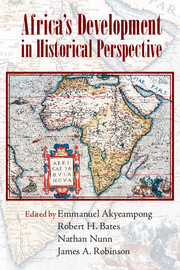Book contents
- Frontmatter
- Contents
- Author Biographies
- Acknowledgments
- Introduction
- Part I La Longue Durée
- Part II Culture, Entrepreneurship, and Development
- Part III Institutions
- Part IV External Forces
- 14 Dahomey in the World: Dahomean Rulers and European Demands, 1726–1894
- 15 The Transatlantic Slave Trade and the Evolution of Political Authority in West Africa
- 16 Gender and Missionary Influence in Colonial Africa
- Index
- References
15 - The Transatlantic Slave Trade and the Evolution of Political Authority in West Africa
Published online by Cambridge University Press: 05 September 2014
- Frontmatter
- Contents
- Author Biographies
- Acknowledgments
- Introduction
- Part I La Longue Durée
- Part II Culture, Entrepreneurship, and Development
- Part III Institutions
- Part IV External Forces
- 14 Dahomey in the World: Dahomean Rulers and European Demands, 1726–1894
- 15 The Transatlantic Slave Trade and the Evolution of Political Authority in West Africa
- 16 Gender and Missionary Influence in Colonial Africa
- Index
- References
Summary
Since the publication of Douglas North’s Structure and Change in Economic History (1981), social scientists have accumulated an abundance of new evidence showing how institutions shape the structures and performance of economies as they move through time. African economies are no exception. The term patrimonial (or neo-patrimonial) is controversial, but it is often used to describe a class of postcolonial African nation-states where a weak federal authority attempts to rule over ethnically based local authorities. Political stability often rests on an unstable coalition of patrons and clients who extract large amounts of national income through personal networks, intimidation, corruption, and bribes. In these kinds of “failed states,” public policy is influenced more by a political calculation to retain the privileges of power than by the political authorities’ credibly committed to improve growth and welfare. The recent spread of democratic institutions like multiparty politics has improved accountability, but stability and violence are often more pressing concerns. It is difficult for people to prosper under this kind of uncertainty, unless of course they have access to a personal network of patrons and clients that defines the resources available to them.
What are the historical origins of this type of political system? The traditional view links it to the era of colonial rule and how it birthed a disjointed and decentralized nation-state. Mamdani (1996) is perhaps the best-known proponent of this view. He sees the most important political outcome of colonial rule to be a kind of dual legal system – European laws for colonial rulers and a variety of “customary” laws for colonial “subjects.” In a very real sense, the postcolonial nation-state is the colonial state adjusted to new political realities like democratic elections, new global economic forces, stronger internal challenges, and mounting international debt.
- Type
- Chapter
- Information
- Africa's Development in Historical Perspective , pp. 460 - 488Publisher: Cambridge University PressPrint publication year: 2014
References
- 9
- Cited by

